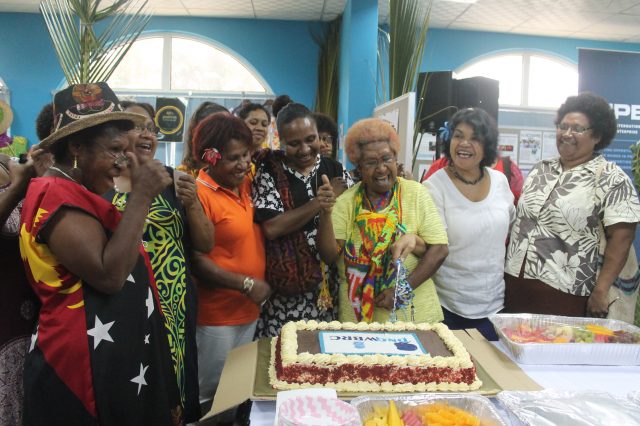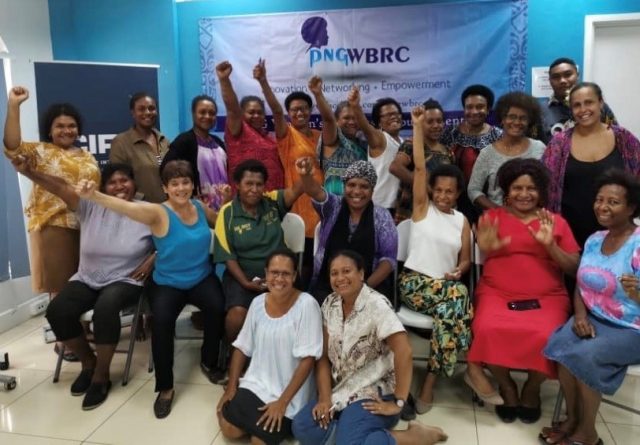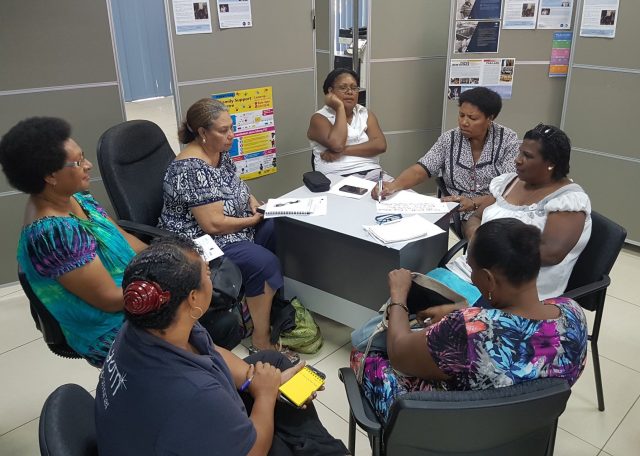The Women’s Business Resource Centre (WBRC) in Papua New Guinea is entering its fifth year of helping to democratize opportunity in PNG by breaking down barriers faced by women entrepreneurs. The Center for International Private Enterprise (CIPE) takes a look back at four years of ground-breaking work through the WBRC in a country where women face extraordinary challenges to economic empowerment.
The WBRC’s Inception
One of the largest countries in the Pacific, Papua New Guinea (PNG) is a diverse country rooted in a variety of different languages and cultures, but there remain limited channels and resources that allow for clear and transparent communication between the government and its population. Vulnerabilities within the economy such as the informal/formal sector divide, inequality of available opportunities between urban and rural areas, and issues rooted in gender bias continue to limit economic growth.

Women in particular face extraordinary challenges in PNG. About two thirds of PNG women are victims of gender-based violence and a majority of women workers are employed in the informal economy. There is a huge opportunity cost to these unfortunate circumstances, as their potential as empowered, contributing members of society is stunted. This is unfortunate, especially because overwhelming research has found that equal participation of women in the economy leads to a stronger, more prosperous country and ultimately strengthens both free markets and democracy around the world. As such, leveling the playing field for equal participation of women in the economy is critical to the advancement of all countries, and PNG is not an exception.
In this context, CIPE launched an initiative in 2015 with initial investment from the U.S. Department of State and the Government of Australia’s Department of Foreign Affairs and Trade under the Pacific Women Shaping Pacific Development portfolio to encourage, support, and reward women’s entrepreneurship in PNG. The project sought to fill a major gap within the ecosystem that exists for women’s economic empowerment in PNG. Specifically, CIPE aimed to address the overwhelming need women engaging in economic activities expressed: to safely and reliably access credible information and trainings that would help them as entrepreneurs.
In November 2016, CIPE opened the doors of the PNG Women’s Business Resource Centre (WBRC) in Port Moresby. The WBRC is a walk-in center that provides a safe place where women of all backgrounds can network with each other, learn from each other, and receive professional training, capacity building, and financial literacy education. The building that the WBRC is housed in has round-the-clock security and is also situated near public bus routes to be easily and safely accessible. Childcare services are provided to ensure that women with young children are not excluded. Additionally, accommodations have been made to ensure full access of other marginalized women, including those who are of low literacy or with disabilities.
Key Achievements
- Since opening its doors, 3836 women have been direct beneficiaries of WBRC training and business services.
- Following the closure of the Centre in March due to COVID-19, an additional 640 women benefited from virtual engagement with WBRC staff.
- 262 technical and vocational trainings were held for aspiring and established women entrepreneurs.
- Through utilizing resources at the WBRC, 1444 women reported increased knowledge on how to start or grow a business.
- The WBRC diversified and increased learning opportunities for marginalized communities through tailored and accessible content.
- 42 network introductions were made between aspiring women entrepreneurs and experienced businesswomen at value chain networking events.
Since the center’s inception, more than 3800 women have utilized WBRC training and business services. Indeed, more and more women in Port Moresby are finding the WBRC to be a safe and accessible resource hub to access the tools and information to implement their business ideas. Beneficiaries have reported increased confidence, more frequent business successes, and improved livelihoods, among other outcomes. As one WBRC member explained:
“It is important to have centres like the WBRC. Women need extra support not only to start businesses, but to challenge their own thinking about their pre-defined roles in society and the economy. The WBRC helps women to find relevant training, experiment with business practices, to be connected to opportunities to market products and seek capital and be around like-minded women and men. This helps women entrepreneurs gain the emotional and mental support they need to attain their business goals.”
Over the last four years, the WBRC became a mainstay for women seeking basic information and support on how to become entrepreneurs in PNG. The WBRC has offered a multitude of training sessions and workshops that enable and empower women of all backgrounds, education and literacy levels, and various levels of business to thrive in PNG’s economic ecosystem. From basic women’s rights, confidence building, and financial literacy, to workshops on business management, how to register businesses with the Investment Promotion Authority (IPA) and Internal Revenue Commission (IRC), supply chains, and two flagship programs, Strive High and the Guria Business Accelerator Program, the WBRC offers multi-faceted development opportunities for both aspiring and established women entrepreneurs that were unavailable just four years ago.

And as the desire for distinct trainings grew over the years, CIPE worked to solidify course offerings that enable and empower women of all backgrounds, education and literacy levels, and various levels of business experience to thrive in PNG’s economic ecosystem. This included diversifying and strengthening trainings and workshops as well as expanding the various existing programs held at the WBRC that allow women to network and access opportunities for entry into new value chains. In the last four years, 280 technical and vocational trainings have been held at the WBRC for aspiring and established women entrepreneurs in addition to 18 other networking events hosted in collaboration with Pacific Women Shaping Pacific Development network partners.
In responding to the information needs of women, the WBRC developed and published the “Step-by-Step Guide on How to Start a Business in Papua New Guinea,” an easily digestible pamphlet that provides details for women on fundamental requirements on establishing and registering a business with the IPA and moving from the informal to the formal sector. The booklet has proved invaluable and has become a key resource on the registration process and tax requirements that are otherwise difficult for women (and men) to ascertain. CIPE has received notice from IPA that they have also utilized the pamphlet for their own information sharing purposes.
Additionally, the opportunity to network and meet like-minded women through the WBRC has long been a unique offering valued by many of the Centre’s users. Several women who have met at training sessions hosted at the WBRC have had opportunities to spark organic conversations, and in some cases, explored ways to collaborate. Additionally, the WBRC’s mentorship program allows for women to support one another and for more experienced entrepreneurs to share best practices with aspiring entrepreneurs. The key to the WBRC’s success has been the Centre’s ability to build relationships and bring in resources for women who otherwise would not be able to access such resources elsewhere.

At the beginning of 2020, no one would have guessed that a global pandemic would uproot the lives of men and women across the world. When COVID-19 arrived in PNG in March, lives were dramatically altered. The momentum and normalcy of the WBRC came to a halt with the pandemic and the need to learn, adapt, and respond was critical. Since closing the WBRC in mid-March 2020, CIPE has readjusted and pivoted its programming and has re-evaluated its value proposition and core offerings to PNG women, especially in a teleworking environment. Since the closure of the Centre, approximately 640 women have had contact with WBRC staff regarding support services and referrals, indicating the continued momentum of the Centre despite its physical closure.
To better understand the circumstances of women entrepreneurs in the COVID-19 era, CIPE commissioned a survey in July 2020 with WBRC staff to understand the impact of COVID-19 on 298 women and their businesses. Respondents shared how the pandemic was affecting them and their businesses and stated their various needs as users of the WBRC. Direct results from efforts such as this ensure that the WBRC remains relevant and valuable to community stakeholders. The survey findings were not only relevant and valuable but allowed CIPE to identify key needs that will be included as a part of future programming for continued business resiliency of women entrepreneurs.
Even during periods of extreme vulnerability for PNG women, CIPE has been able to continue encouraging, supporting and rewarding women’s entrepreneurship through the WBRC. CIPE remains committed to realizing equal opportunity and advancement for women in PNG. As demonstrated over the past four years since the inception of the WBRC, the impact of the training courses and networks provides women with the agency to unlock their potential as leaders, entrepreneurs, and contributors within their communities.
The WBRC has gained worldwide attention and has served as a model for similar initiatives in emerging economies and developing countries. The PNG WBRC now serves as a model for CIPE’s Center for Women’s Economic Empowerment (CWEE), which has launched similar initiatives with support from the U.S. Department of State’s Bureau of Democracy, Labor, and Human Rights in Jordan and Guatemala, illustrating the reach of the impact the WBRC has across the world. In this way, the PNG WBRC is laying the foundation for new paths for women entrepreneurs across the globe.
To learn more about the WBRC, please visit the website at www.pngwbrc.com or the Facebook page at www.facebook.com/pngwbrc
Published Date: December 18, 2020
